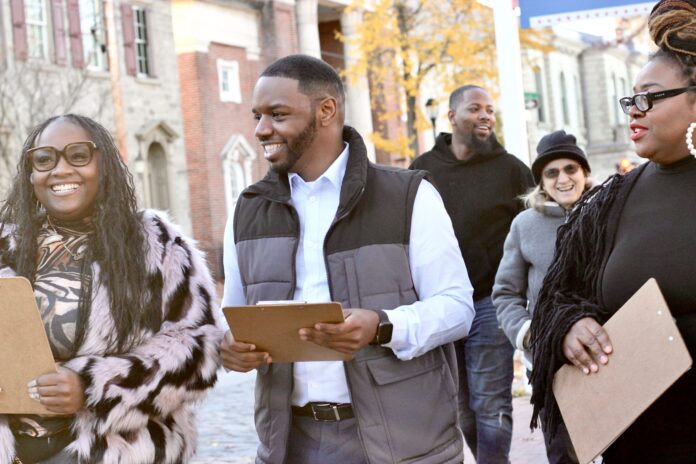
Newcomer Andre D. Carroll has won the seat for House District 201, becoming the second openly gay, Black state representative. Though a fresh face in electoral politics, the 33-year-old has spent his career uplifting candidates and constituents alike.
House District 201, which includes parts of Germantown, East Germantown, West Oak Lane, Ogontz and Logan, was left vacant when Rep. Stephen Kinsey retired on July 16. This announcement, alongside the unrelated retirement of Rep. Donna Bullock, resulted in Sept. 17’s special election. Kinsey served for 11 years and left four months earlier than anticipated.
This vacancy gives an opportunity to the next generation of leaders for District 201, and Carroll has stepped up to help the place he calls home.
“I’m proud of the lived experience that I’ve had because it’s made me the quality of person I am. Being a young, Black, queer person, gave me the opportunity to learn more about the disparities that happen in the communities that I’m a part of,” he previously told PGN. “I believe the majority of people in this country want to be led by people with similar experiences to theirs. Because I have that, it makes me a better leader for the majority.”
This desire to address systemic inequity has been a hallmark of Carroll’s career and a reflection of his lived experience. Born in 1991, Carroll was quickly impacted by both the mass incarceration of Black men, including his own father, and the War on Drugs, which affected his mother. His maternal grandmother raised him alone while living with a severe work-related injury.
When Carroll’s grandmother died in 2009, a few short months after he graduated high school, Carroll found himself working multiple jobs in the service industry to help himself and his infant brother get by. There, he discovered that “minimum wage is not a living wage” and was forced to drop out of his bachelor’s degree program due to the expense.
“I think that these lived experiences have not only been very similar to my other community members’, but it’s also a testament to why I do the work that I do,” Carroll told the Pennsylvania Capital-Star. “[It’s] why I’ve committed to connecting our seniors to quality healthcare resources after losing my grandmother to liver cancer, why I mentor young folks, how I focus on those that find themselves in the criminal justice system and why I decided to become an educator because of the closure of the high school that I graduated from.”
Having seen his own story reflected in the people he wanted to help, he began working directly with disaffected youth. While acting as a substitute teacher throughout the Philadelphia public school system, Carroll launched a financial literacy program for high school students within the Philadelphia City Controller’s Office. This exposure to underprivileged youths showed him where the education system was struggling to meet the needs of young people.
“I truly believe that when it comes to investing in our schools, we have to disproportionately invest in the districts that have been divested from,” Carroll said. “These schools are not being invested in, and the school to prison pipeline — that’s a very real thing.”
Carroll’s wake-up call to enter politics began with Pennsylvania House’s proposition in 2021 that would have put stricter sentences on crimes where guns were present. Though it did not pass the legislative process, the impact of this bill caused Carroll to recognize that, if he wanted to make a difference, he had to start affecting change on a congressional level.
Many of the candidates he once supported directly, including Nicolas O’Rourke of the Working Families Party, have now offered their endorsement, alongside Sen. Bob Casey and U.S. Representative Dwight Evans (D-Phila.). The areas he wants to address first include education, elder care, gun restrictions, raising the minimum wage and addressing the toll of gentrification. He believes these changes can all be achievable during his tenure.
“All of these proposals, designed to improve the quality of life for working class families and seniors, are attainable by moving existing programs closer to working class folks,” he explained. “One example is the annual rent rebate program. It’s not creating a new law. It’s improving upon existing policies.”
He spoke of how disenfranchised people have long said that the government doesn’t work for them. However, he pointed out that the government works as intended for those it was designed for. He added that this comes at an unfortunate cost to working class communities that have largely gone ignored in their struggles.
Carroll’s campaign work for the likes of Bernie Sanders, District Attorney Larry Krasner, City Councilmember Isaiah Thomas, and State Sen. Anthony H. Williams showed him the power of putting working class candidates into positions of power. The changes they enacted laid the groundwork for his policies.
“As a working-class person, I understand the dire need to have the government serve folks when they need it the first time. I will be a representative for folks in that community,” Carroll said.
The term for members of the Pennsylvania House of Representatives is two years, and the position does not have term limits. Carroll will take office on Dec. 2. He ran uncontested.
“Becoming the second openly gay, Black state representative, behind Malcolm Kenyatta, I want to say that Black history is queer history, and queer history is American history, and I am honored in this moment to be part of that,” Carroll said. “You have to follow your heart and dreams, you have to lead with compassion, dignity and respect of others and that is how we move America forward.”
